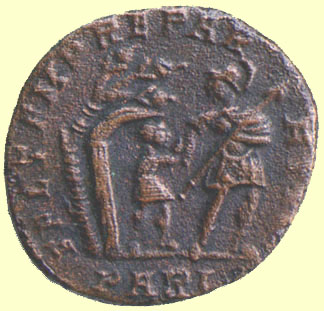 Contents -
Previous Article -
Next Article
Contents -
Previous Article -
Next Article
Scholars have been trying since the middle of the Third Century to explain why the barbarian attacks sharply increased in severity and number since then. Theories range from a warmer climate in Europe bringing about a rise in the birth rate amongst the German tribes to a migration of several tribes from East to West. This migration is thought to have been caused by Huns, fleeing westward from savage tribes in what is now Mongolia and in turn forcing the Goths ahead of them. The Goths are also believed to have dwelt in Scandinavia for several generations before settling in the region around the Black Sea. To the south and west of the Goths was the Roman Empire. Eventually, the emperor Valens permitted them to cross over the Danube in A. D. 376. However, there was a constant increase in barbarian raids against the frontiers of the Roman Empire since the reign of Marcus Aurelius, who spent almost his whole reign fighting German tribes on the northern frontiers. During the reign of Decius, whatever mysterious force was pushing these barbarians westward suddenly stepped up in intensity, and Emperor Trajan Decius found himself desperately defending the empire against attack. Decius himself was killed in battle against the Goths, and the continuous widespread fighting against invading tribes continued from about 249 until the Emperor Claudius II soundly defeated them in 268 and 269, largely eliminating them as a threat to the empire for the next 110 years. For these victories, the grateful Romans honored Claudius II with the title "Gothicus".
Go to next article:
Go back to previous article: